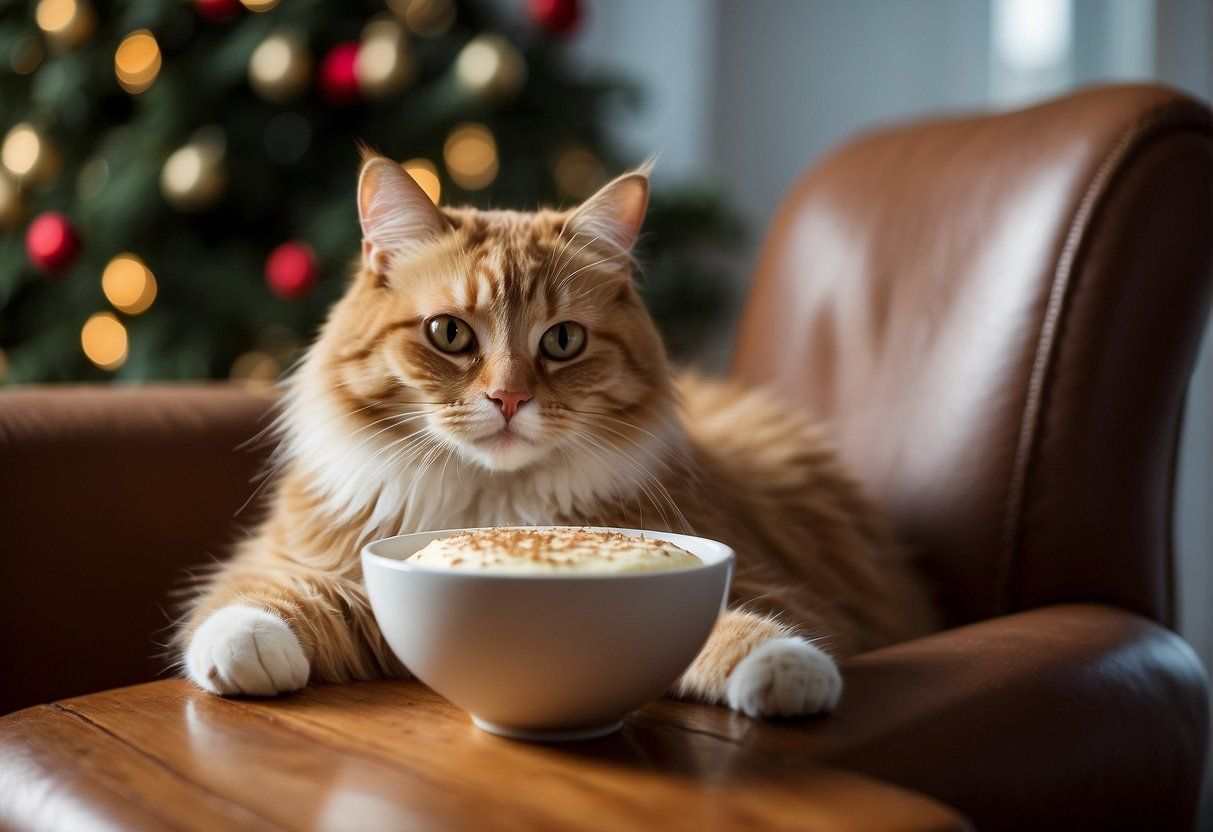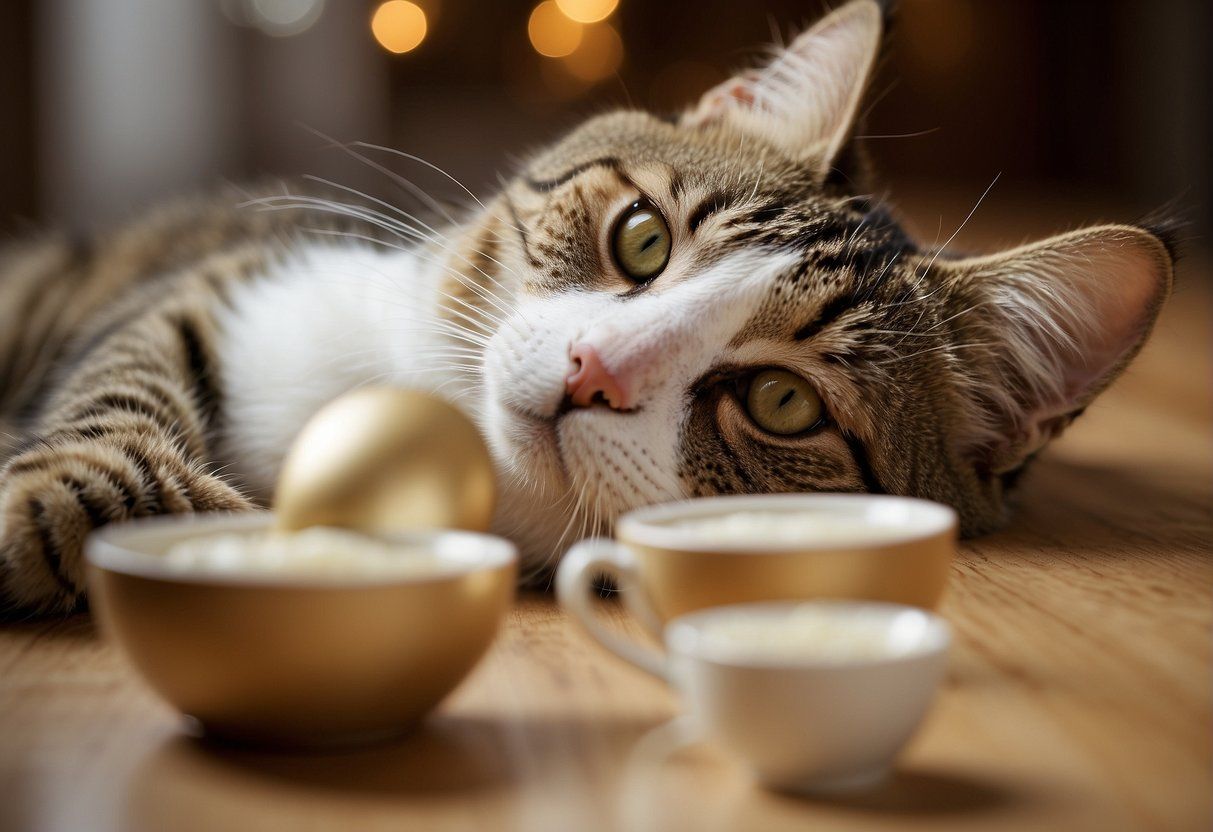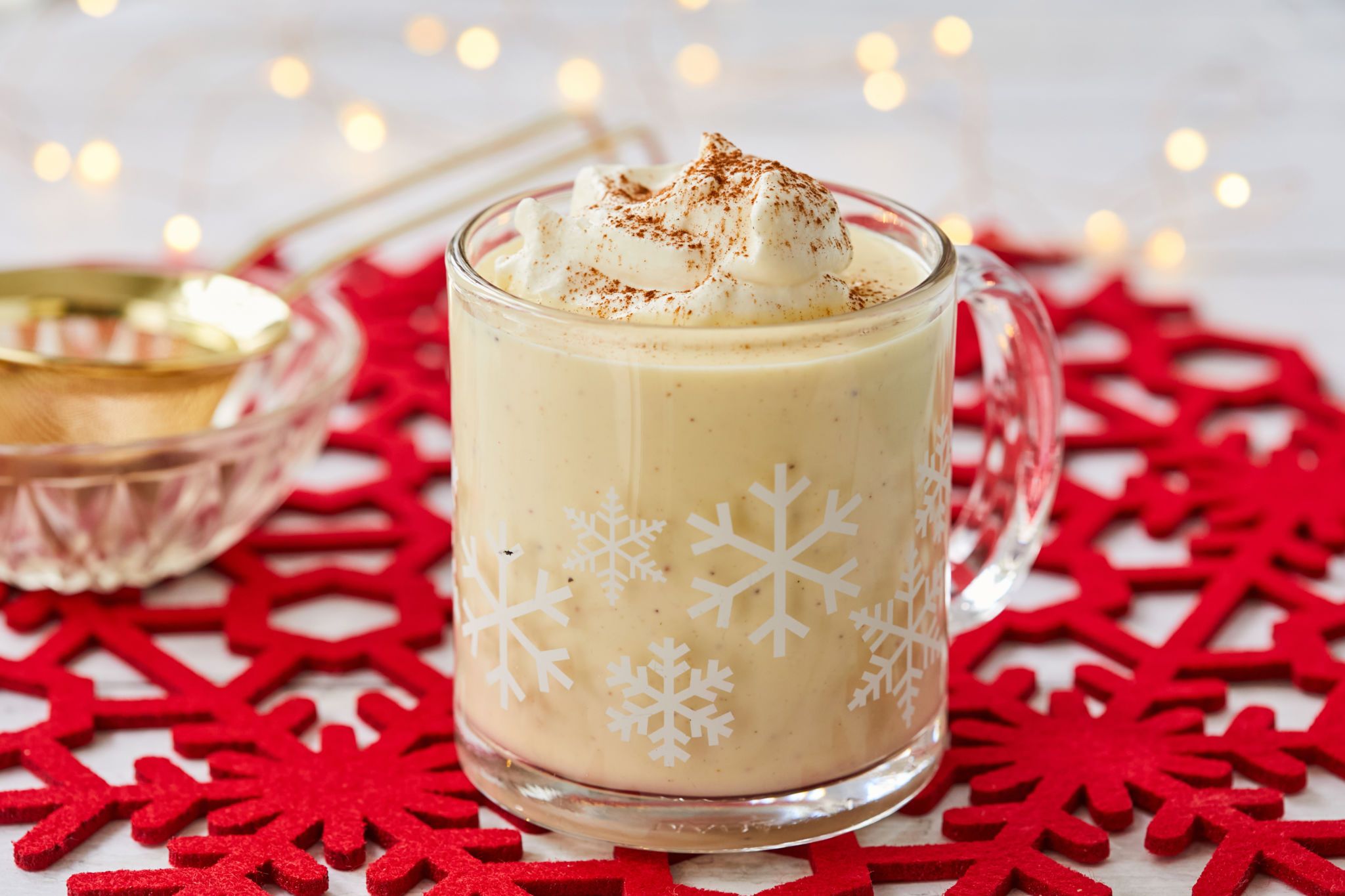Can Cats Have Eggnog? Answered!
Can Cats Have Eggnog? Answered!

Vet Reviewed

By: Sarah Hodgson
February 18, 2024
- Posted in Cats
Table of Contents
Whether it's the holiday season or not and you have a bottle of eggnog that you want to share with your cat, can you? Eggnog is a popular holiday drink that many people enjoy during the festive season. However, can our feline friends partake in this creamy beverage? The answer is not as straightforward as a simple yes or no. While cats can technically have eggnog, there are several factors to consider before giving them a taste.
Quick Answer:
Eggnog is not recommended as a regular treat for cats. While some cats may enjoy the taste of eggnog, it is not a natural part of their diet. Additionally, many eggnog recipes contain ingredients that can be harmful to cats, such as alcohol, nutmeg, and cinnamon.
What Is Eggnog?
Eggnog is a popular holiday drink that is made with milk, cream, sugar, eggs, and spices. It is often spiked with alcohol, such as rum or brandy, to add an extra kick. While many people enjoy eggnog during the festive season, cat owners may wonder if it is safe for their feline friends to consume.
Ingredients and Their Effects on Cats
Milk and cream are the main ingredients in eggnog, and they contain lactose, a type of sugar that can be difficult for cats to digest. Consuming lactose can lead to digestive upset, such as diarrhea or vomiting. In addition, eggnog contains sugar, which is not a necessary part of a cat's diet and can lead to weight gain and dental issues.
Eggs are also a key ingredient in eggnog, and while they are a good source of protein for cats, they should be consumed in moderation. Raw eggs can contain harmful bacteria, such as Salmonella, which can make cats sick. It is best to avoid feeding cats raw eggs or any food that contains raw eggs.
Spices such as nutmeg, cinnamon, and vanilla are often added to eggnog for flavor, and while they are not harmful to cats in small amounts, they should not be consumed in large quantities. These spices can cause digestive upset and may even be toxic to cats in high doses.
Alcohol Content and Risks
Eggnog is often spiked with alcohol, which can be dangerous for cats. Alcohol can cause a range of health issues in cats, including vomiting, diarrhea, difficulty breathing, and even coma or death. It is important to keep eggnog and other alcoholic beverages away from cats to prevent accidental ingestion.
In conclusion, while eggnog may be a festive and delicious treat for humans, it is not recommended for cats. The lactose, sugar, and alcohol content in eggnog can be harmful to cats and can cause a range of health issues. It is best to stick to cat-friendly treats and to consult with a veterinarian if you have any concerns about your cat's diet.
Can Cats Have Dairy Products?
Cats are known to love milk, but the question remains whether they can consume dairy products such as eggnog.
As mentioned earlier, lactose is a type of sugar found in milk and cream. While some cats may be able to tolerate small amounts of lactose, others may be lactose intolerant and experience digestive upset when consuming dairy products.
It is estimated that up to 50% of cats are lactose intolerant. Therefore, it is not recommended to feed cats dairy products such as eggnog, especially in large quantities.

Can Cats Have Eggnog?
As we mentioned earlier in the article, while cats may enjoy the taste of eggnog and other dairy products, it is best to avoid feeding them to prevent lactose intolerance symptoms. That includes eggnog.
Besides the lactose aspect if the eggnog contains alcohol it can be a serious risk for cats. We'll dive into all the risks below.
The Risks for Cats Consuming Eggnog
While eggnog may seem like a festive treat for cats, you shouldn't give your cat eggnog no matter the season. Why? We'll explore the risks now.
One of the most common issues that cats may experience after consuming eggnog is digestive upset. This can manifest as diarrhea, vomiting, and other gastrointestinal issues. If your cat is experiencing these symptoms, it is important to monitor them closely and seek veterinary care if necessary.
In addition to short-term digestive issues, there are also some long-term health risks associated with cats consuming eggnog. For example, the high sugar and fat content of eggnog can contribute to obesity and diabetes in cats. Additionally, the spices commonly found in eggnog, such as nutmeg, can be toxic to cats in large quantities.
To avoid these health risks, it is recommended that cats do not consume eggnog.
Safe Holiday Practices for Cat Owners
The holiday season is a time for celebration and indulgence, but it's important for cat owners to remember that some festive treats can be dangerous for their furry friends. Here are some tips that can help keep your cat safe.
Keeping Eggnog Out of Reach
Eggnog contains several ingredients that can be harmful to cats, including dairy, sugar, and alcohol. Even small amounts of these ingredients can cause digestive upset, dehydration, and even alcohol poisoning in cats. Therefore, it's important for pet owners to keep eggnog and other holiday beverages out of reach of their cats.
To prevent accidental ingestion, pet owners should store eggnog in a secure location, such as a refrigerator or cupboard that their cats cannot access. Additionally, pet owners should be cautious about leaving glasses or cups of eggnog unattended, as curious cats may be tempted to investigate.
Alternative Festive Treats for Cats
While eggnog may be off the menu for cats, there are plenty of other festive treats that pet owners can offer their feline friends. For example, pet stores often sell special holiday-themed cat treats that are safe and enjoyable for cats.
Additionally, pet owners can get creative in the kitchen and make their own cat-friendly holiday treats. Some ideas include baking catnip-infused cookies or offering small pieces of cooked turkey or chicken as a special holiday meal.
By being mindful of the potential dangers of holiday treats and taking steps to keep their cats safe, pet owners can ensure that their furry friends can enjoy the holiday season alongside them.

Preparing Cat-Friendly Holiday Recipes
When it comes to holiday feasting, everyone in the family wants to enjoy the festive treats and drinks, including our feline friends. However, not all human foods are safe for cats, and some may even be toxic. That's why it's important to prepare cat-friendly holiday recipes to ensure your furry companion stays healthy and happy during the holiday season.
Non-Dairy Eggnog Variations
Eggnog is a popular holiday drink that many people enjoy. However, traditional eggnog contains milk, which can upset a cat's stomach. Luckily, there are non-dairy eggnog variations that you can make for your cat.
Silk nog, soynog, tofu nog, and grain nog are all non-dairy eggnog options that are safe for cats to consume. These alternatives are made from soy milk, almond milk, or other plant-based milks, making them a great option for cats with dietary needs or lactose intolerance.
To make your own cat-friendly eggnog, simply mix your preferred non-dairy milk with cooked chicken or other cat-safe ingredients to create a delicious and nutritious treat that your cat will love.
Nutritional Considerations
When preparing cat-friendly holiday recipes, it's important to consider your cat's nutritional needs. While treats are a great way to celebrate the holidays, they should not make up a significant portion of your cat's diet.
When making eggnog or other treats for your cat, be sure to use high-quality ingredients and avoid adding excess sugar or salt. Additionally, make sure to consult with your veterinarian to ensure that your cat's dietary needs are being met.
By following these tips and preparing cat-friendly holiday recipes, you can ensure that your cat stays healthy and happy during the holiday season.
When to Consult a Veterinarian
If a cat ingests eggnog or any other toxic substance, it is important to consult a veterinarian. The following symptoms may indicate an emergency:
- Gastrointestinal issues such as vomiting and diarrhea
- Seizures
- Coma
- Loss of appetite
- Lethargy
- Salmonella or other food poisoning symptoms
- Alcohol poisoning symptoms
A veterinarian can provide the necessary treatment and care to help the cat recover from toxic ingestion. It is important to seek veterinary care as soon as possible to prevent serious health issues or death.
In summary, recognizing emergency symptoms in cats is crucial to prevent serious health issues. If a cat ingests eggnog or any other toxic substance, immediate action should be taken and a veterinarian should be consulted. By following the appropriate steps, cats can receive the necessary care and treatment to recover from toxic ingestion.
The Bottom Line
So there you have it, even though we might want to share all of our tasty snacks and treats with our cats sometimes it's best not to.
So while cats can technically have eggnog, it is not recommended due to its high sugar and fat content. Always consult with your veterinarian before giving your cats any new foods or treats.
Frequently Asked Questions
What are the risks of giving cats eggnog with nutmeg?
Nutmeg can be toxic to cats in large amounts. Symptoms of nutmeg poisoning include vomiting, diarrhea, tremors, seizures, and even death. Even small amounts of nutmeg can cause adverse reactions in some cats. Therefore, it is best to avoid giving cats eggnog that contains nutmeg.
Can cats drink eggnog that contains cinnamon?
Cinnamon is not toxic to cats, but it can cause digestive upset in some cats. Therefore, it is best to avoid giving cats eggnog that contains cinnamon.
What non-alcoholic alternatives to eggnog can cats have?
There are many non-alcoholic alternatives to eggnog that cats can enjoy, such as plain yogurt or unsweetened almond milk. However, it is important to introduce new foods to cats gradually to avoid digestive upset.

Subscribe to Petfluence!
Get updates on the latest posts and more from Petfluence straight to your inbox.